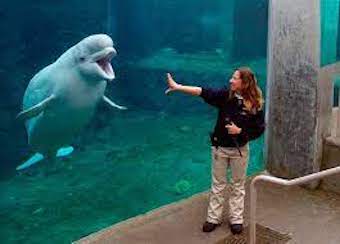A few weeks ago, five beluga whales were transferred from Marineland Canada in Niagara Falls to Mystic Aquarium in Connecticut. There was no public public consultation, indeed none of the transparency we would expect if Canada is serious about enforcing laws that aim to phase out whale captivity. There is no evidence that these individuals received the benefit of independent oversight from marine mammal scientists and other relevant experts. We don’t even know whether Marineland bothered to apply for an export permit because, while the trucks were rolling, the government refused to either confirm or deny it. What we do know is that Canada permitted the transfer to proceed.
This was not the intention of Bill S-203 passed in 2019. The law was enacted then because there was widespread public support for ending whale and dolphin captivity, as the public came to recognize that these intelligent, highly social animals don’t belong in tiny concrete tanks. Unfortunately, it did not mean that the 50+ belugas, bottlenose dolphins, and one lone orca still held would be granted their freedom. They would be the last captives in Canada, but Marineland would not be forced to release them to sanctuaries (most would not be good candidates for release back to the wild). There were, however, certain key conditions that would have to be met.
First, these individuals could no longer be forced to perform in shows meant as entertainment for humans. Second, it would now be illegal to breed them. This would indeed be the last generation to endure the living hell of captivity in this country. The tragedy for these remaining whales and dolphins is that they would continue to be regarded as someone’s property, with their lives still to be disposed of as their ‘owners’ saw fit.
To date, Marineland has continued to keep their cetaceans on display, thus preserving whatever revenue stream is still available to them. None have been released. All have continued to languish in apparently deteriorating conditions. News recently emerged of the probable death of yet another beluga at their Niagara Falls facility, which would make 13 in less than two years. So in this sense at least, those transferred to Connecticut may be the lucky ones, as conditions are likely to be at least marginally better there. But this is where the requirements surrounding export permits become all-important.
The recent transfer of these five whales demonstrates that we have to be much better prepared next time if we’re to preserve the spirit and intent of our legislation. If and when Marineland is permitted to sell to other facilities, we must have ironclad guarantees that they go with legally binding permit conditions ensuring that they benefit from the protections they would otherwise be afforded here in Canada. Further, they must not be used to increase the numbers of captive cetaceans in other countries. Canada cannot – must not – simply export this terrible injustice to other parts of the world.
In this case, we got rather lucky, but thanks mostly to U.S. regulators who included strong conditions in Mystic Aquarium’s import permit which will strictly prohibit breeding. From the Canadian side we got little more than vague assurances, despite the fact that documents made public by American regulators made it perfectly clear that Mystic planned to allow the whales to breed. We also owe a great deal of thanks to people like Kaitlyn Mitchell and the rights group Animal Justice for keeping the spotlight on so that this transfer couldn’t proceed shrouded in secrecy – something the Canadian government was apparently willing to allow.
All of you out there who expressed an opinion on social media made a difference too. Don’t doubt that for a moment.
So what does this mean for the future? Most importantly, it means that those of us concerned about putting an end to the nightmare of cetacean captivity, here at home as well as abroad, need to keep the pressure on, and we need to remain vigilant.
Conditions at Marineland continue to be abysmal, and are apparently deteriorating. We have animal welfare laws that need to be enforced, and we can’t let up until the day that not a single captive marine mammal remains in that awful place. Anyone remotely familiar with the present circumstances of Kiska’s life in particular has to know that there is no way this isn’t cruelty and neglect under our existing animal welfare framework. Government of Ontario – enforce the damned laws. We’ll be watching.
As for Mystic Aquarium, let’s keep an eye on what happens four to five years from now. Mystic’s president admitted publicly that he still hopes to be allowed to breed the new arrivals – four females and one male, all of whom will reach sexual maturity in about that time. For now it doesn’t appear he’ll be successful, but let’s not take our eye off the ball.
As far as it goes with our federal government’s handling of export permits here in Canada, our primary demand needs to be for transparency. This latest episode ought to be a lesson to all of us if we’re to meet the obligations we’ve taken on following the passage of S-203. What’s at stake here – the best interests of the whales themselves – cannot be trusted to vague assurances from our public officials. Marineland cannot be permitted to export when the result will be the perpetuation of the horrors of captivity for future generations.
For The Orca’s Voice,
Phil, Canadian Cetacean Alliance



Leave a Reply